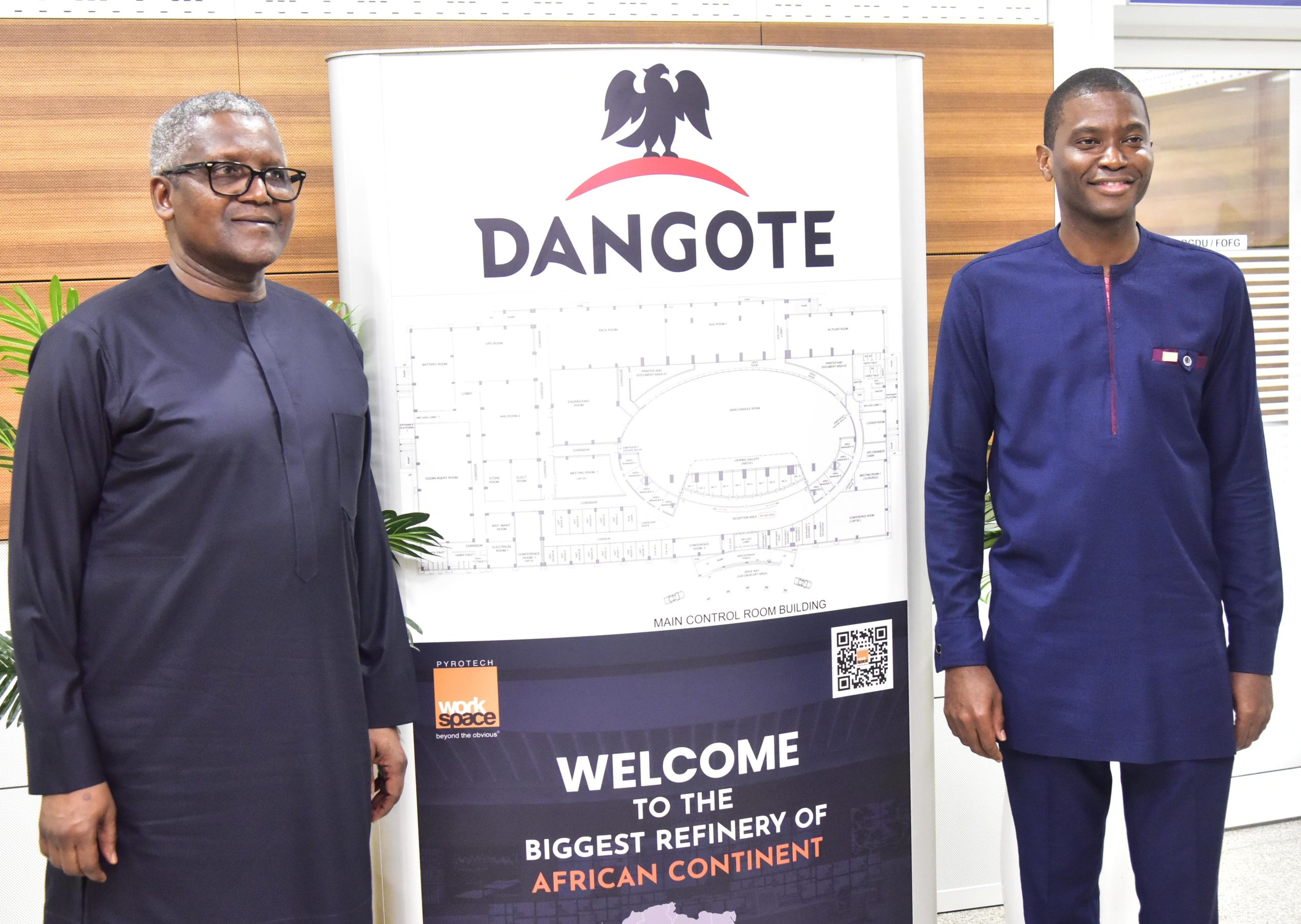
Caption from left: President/CE, Dangote Industries Limited, Aliko Dangote and Prime Minister, Grenada and Chairman CARICOM, Hon. Dickon Mitchell, during the Prime Minister’s visit to Dangote Petroleum Refinery, Petrochemicals and Fertiliser Plant in Lekki, on Friday October 10, 2024.
…Grenada PM says Dangote Refinery will save Africa from being a Dumping Ground
The Prime Minister of Grenada, Dickon Mitchell, has described the Dangote Petroleum Refinery and Petrochemicals as a significant investment in industrialisation and manufacturing needed by developing countries for their industrial growth.
He noted that it is through this type of investment that Africa and the developing countries can reverse the cycle of exporting raw materials while importing finished products from developed countries.
This is as Dangote hinted at potential partnerships with the Caribbean community in the production of cement and fertilisers as well as petroleum products.
Mitchell, who is the chairman of the Caribbean Community (CARICOM or CC) – a political and economic union of 15 member states and five associated members throughout the Americas, The Caribbean and Atlantic Ocean, disclosed this on Thursday during his tour of the Dangote Petroleum refinery and Petrochemicals complex in Ibeju Lekki, Lagos.
Mitchell said the investment is a tribute to the President of Dangote Group, Aliko Dangote and his vision not just for Nigeria but Africa as a whole.
“This investment is a tribute to Dangote and his remarkable vision. It is the first of its kind in Nigeria and Africa, symbolising what the developing world needs: significant investment in industrialisation and manufacturing. This is an incredible achievement and a testament to Mr. Dangote’s vision, not just for his company, but for Nigeria and Africa as a whole.
“Dangote exemplifies what an African leader should be. We need not just political leaders, but business leaders who are willing to invest in Africa, particularly in manufacturing and industrialisation. We must ensure that we don’t continue to export our raw materials to the developed world, where they can be turned into sophisticated products and sent back to us. We need to reverse that cycle; it is the only way to grow the wealth of Africa and the developing world. Additionally, we need to support this with training and invest in job opportunities,” he said.
Applauding the sophistication and automation at the refinery, the Prime Minister expressed optimism for Nigeria’s future, especially given the number of young Nigerians trained and working at both the refinery and fertiliser plants. The $20 billion refinery, the largest private investment in Africa, stands out for its team of young professionals, predominantly aged between 26 and 28, most of whom hold advanced degrees and were educated in Nigeria.
“It has been a wonderful experience to witness the shared skills, depth of sophistication, and automation here. Seeing so many bright young Nigerians, particularly in the laboratories, is truly inspiring. I believe this bodes well for the future development of Nigeria,” he added.
Mitchell stated that the Caribbean Community would be exploring partnership opportunities with the Dangote Group to enhance its economy.
“One of the reasons I am here is to pursue synergies and partnerships between the diaspora and Africa, particularly in areas such as the refinery, cement, and fertiliser. We believe there are fantastic opportunities to develop partnerships between the Caribbean and Africa,” he added.
On his part, Dangote described the visit as symbolic, noting that many Caribbean countries are beginning to discover crude oil and are exploring opportunities to build their own refineries. This would help them address the challenge of exporting crude while importing refined petroleum products at high costs.
“The visit shows that many countries are proud of what we have been able to achieve because a lot of countries have been unable to deliver their refineries. It shows their pride in seeing a Black person like them at the Caribbean, although I am from Nigeria, succeed. For them, this is a dream, especially as many Caribbean countries are beginning to discover oil but still depend largely on exporting crude while importing petroleum products, which is costlier than in America. Their dream is to set up a refinery—perhaps not of this size—but one that would cater to their people,” he said.
Africa’s wealthiest man emphasized that the company is looking for partnerships in the Caribbean not only in petroleum products but also in cement and fertilizer production. He mentioned ongoing discussions about importing crude from these countries while supplying them with refined products.
“There are numerous partnerships in place. He is not only the Prime Minister of Grenada but also the Chairman of the Caribbean Community (CARICOM). We are exploring collaboration in areas such as cement and petroleum, including the possibility of buying crude from them while selling some of our petroleum products to them. We already export to the U.S., Mexico, and other regions, so there is significant collaboration we are looking to develop between us and them,” he added.
The 650,000 barrels per day (bpd) Dangote Oil Refinery—the largest single-train refinery in the world—is designed to process a wide variety of crude oils, including those from Africa, the Middle East, and US Light Tight Oil. It conforms to Euro V specifications and is built to meet stringent standards set by the US Environmental Protection Agency (EPA), European emission norms, the Department of Petroleum Resources (DPR), and the African Refiners and Distributors Association (ARDA). The refinery has the capacity to satisfy 100% of Nigeria’s demand for petrol, diesel, kerosene, and aviation jet fuel, with additional surplus available for export.